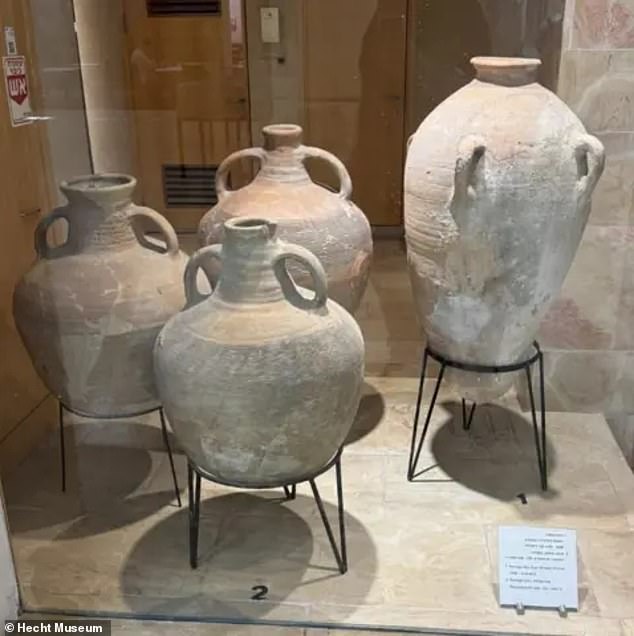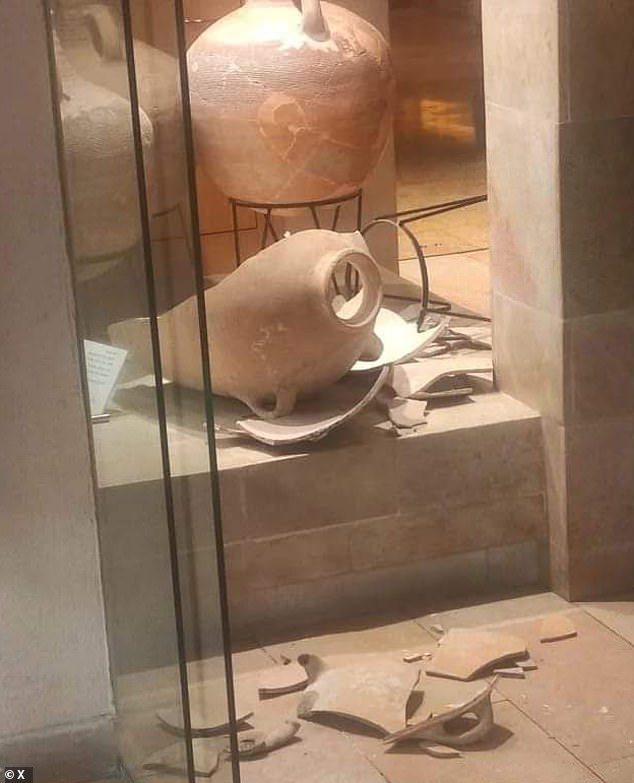Boy accidentally smashes 3,500-year-old jar on visit to Israel’s Hecht Museum
- A four-year-old boy accidentally destroyed a 3,500-year-old pot in Israel
- It was displayed at the entrance of the museum without glass
A young boy accidentally smashed a 3,500-year-old pot while visiting a museum in Israel.
The pot, which dates from the Bronze Age between 2200 and 1500 BC, was on display at the Hecht Museum in Haifa for 35 years until the four-year-old knocked it over on Friday.
It was displayed at the museum entrance without glass, because museum administrators believe there is a “special charm” in displaying archaeological finds “without obstacles.” according to the BBC.
The boy then “took a light tug on the pot” because he was “curious about what was inside,” causing the pot to fall over, according to the boy’s father, Alex.
He added that he was “in shock” when he saw his son standing next to the broken pot – and at first thought “it wasn’t my child who did it.”
A four-year-old boy accidentally destroyed a 3,500-year-old pot while visiting the Hecht Museum in Haifa
But instead of punishing the child, museum director Dr. Inbal Rivlin told him, “Don’t be afraid, we have no claim on you,” This was reported by Sky News.
She then invited the child’s family to return to the exhibition for an organized tour.
“There are known cases where exhibits are deliberately damaged. In such cases, very strict measures are taken and even the police are called in,” explains Lihi Laszlo, content manager at the museum.
‘However, in this case that was not the case. The pot was accidentally damaged by a young child visiting the museum, and the response will be accordingly.’

The jar (intact in the photo) was displayed at the museum entrance without glass, because museum administrators believe that displaying archaeological finds “without obstacles” has a “special charm.”
Museum officials say the jar was likely intended to carry items such as wine and olive oil.
It was discovered in Samaria in central Israel and predates the time of the Biblical King David and King Solomon. It is characteristic of the Canaan region of the eastern Mediterranean.
Such finds are usually broken or incomplete when they are excavated, so the ancient pot was ‘an impressive find’ when it was discovered.

A restoration specialist has now been appointed to restore the pot, and museum officials say it will be back on display in the exhibition space “shortly”.
A restoration specialist has now been appointed to restore the pot and museum officials say it will be back on display in the exhibition space “shortly”.
The boy’s father said he and his family are “relieved” to hear the pot will be restored, but also said they are “sad” because “it will no longer be the same object.”
Despite the accident, museum officials say they will continue their tradition of displaying objects “without barriers or glass walls,” in keeping with the museum’s founder’s goal of making objects as accessible as possible.
However, Dr. Rivlin warns parents that they may need to supervise their children before visiting the museum to ensure that the exhibits are not touched unless explicitly indicated that touching is permitted.
